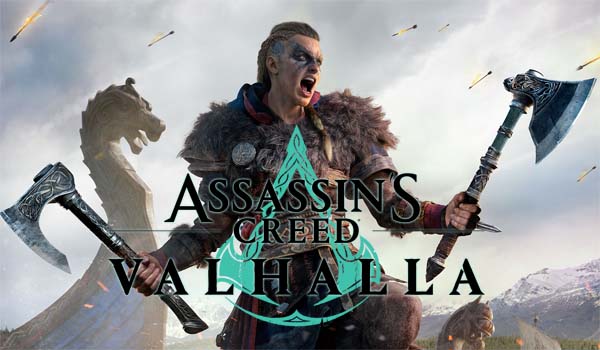
One of the thoughts that dominated my playtime with Assassin's Creed IV: Black Flag was "Oh I hope the next game is a viking-themed game!". I felt that the open-ended sailing and naval combat would work well in a viking setting, complete with raiding coastal villages as an extra way of obtaining wealth and loot (in addition to plundering trade ships in the open sea). Black Flag was so good, it seemed like a sure-fire, slam-dunk idea! What could possibly go wrong?
Well, it turns out: almost everything could go wrong.
I've been hoping for a viking-themed game ever since Black Flag.
For starters, I refused to buy Assassin's Creed: Valhalla at its release because I did not want to give any money to Ubisoft, which has had ongoing legal issues regarding multiple sexual harassment and sexual assault allegations against high-level managers and executives. Like the Catholic Church, Ubisoft may have systematically hid these alleged transgressions and protected the executives who were committing them. Even the company's HR department has been accused of being complicit.
So fuck Ubisoft and its executives, who (if these allegations are true) should all be in prison, and the company's ownership should be given to the employees who were wronged. I wasn't going to give that company a dime of my money, so I waited and watched eBay for cheaper, used copies to show up. I specifically filtered for "used" copies -- none of that "new, sealed" wholesale scalping nonsense that is all over eBay. Buying a sealed copy from an eBay scalper is the same as buying a new, retail copy, as far as I'm concerned. Several months after release, I finally bought a cheap, used copy for about $30 from someone who claimed to have played the game and got bored of it, so that my partner could kill time while stuck at home during the ongoing pandemic in 2021.
She played through the entire game, and liked it just fine. I played a little bit, hated the early hours, and stopped playing it so that I could work on other projects. I only came back to it later (after she had finished) to see if the game had any redeeming qualities. And even then, I did not even come close to completing the game because it's just too damn long, and I have much better things to do with my time.
You had one job, Valhalla! And you couldn't even get that right!
Assassin's Creed: Valhalla is a tedious, repetitive, drawn-out, copy-pasted, glitch-laden, slog of a game and story. It tries to copy the one thing that Black Flag did so well, and which inspired all future sailing mechanics for every Assassin's Creed game that followed, but it actually somehow manages to remove that thing! That's right, there is no naval combat in the game at all. Worse yet, there is absolutely nothing to do with the longship except use it as a vehicle for moving about the empty, sterile seas and rivers. There isn't even much in the way of islands to discover out in the open seas, so even the exploration incentive is gone. The Norway map has a few islands, but the England map has virtually none. In fact, you don't even use the longship to sail the seas around England; you only use it to sail up and down rivers looking for villages to raid. The key selling point of Valhalla, the longship, is nothing more than a glorified truck, and the rivers that run across England are basically just roads.
The longship is little more than a truck, and the rivers are little more than roads between raids.
Things are spaced out a bit more than I usually expect from an Assassin's Creed game. The map isn't quite as littered with mindless collectibles, even though it is still littered with mindless collectibles. But the map still isn't quite big enough, the distances still not quite far enough, and fast travel is still accessible enough, that I never felt it necessary to use the boat as the most efficient method of traversal. If you're stopping at every village to raid, to search for every collectible, and to play every side quest, then you're better off just using your horse, because any time you would save from using the boat will be offset by the extra time it takes to board and unboard the thing everytime you stop for a side quest.
It's like Ubisoft took the castle sieges from Middle-Earth: Shadow of War, stripped out the Nemesis system that gave those sieges context that made them worth playing, and then just put rivers between all the castle gates so you'd have an excuse to attack from the boat. But the longship feels completely unnecessary to the game. Early in the game, the longship feels like it might be a more integral part of the game, when you're sailing around the seas, fjords, and snaky coastlines of Norway, and crossing large bodies of water is necessary. But then you get to England, and the map is almost completely land-locked, save for those traversable rivers. [More]
b4e91cde-3344-4319-bff4-7a26ba6f0fdc|1|3.0
Tags:Assassin's Creed, Assassin's Creed: Valhalla, Assassin's Creed IV: Black Flag, Ubisoft, viking, Norway, Denmark, England, longship, open world, sailing, raid, pillage, plunder, monastery, Warner Brothers Interactive, patent, nemesis
I think the last few years have brought us to a bit of an inflection point for open world video games -- which I feel have been in kind of a rut for the better part of the last decade. Long-time readers of my personal blog will probably be very familiar with my complaints. The two core complaints that I've had with this particular game design paradigm are:
- That the map itself rarely feels meaningful as a game space, and instead serves primarily as a convoluted mission-select screen full of time-wasting filler content.
- That the sandboxy nature of the game design means that the world and narrative often feel stagnant (as if in a kind of "limbo").
This blog is mostly a transcript of a YouTube video that I posted.
These problems can be traced back at least to 2001's Grand Theft Auto III, which set many of the conventions of open world games for the next two decades. Companies from Ubisoft to Bethesda, and many others, would copy GTAIII's structure of going to a location on the map to trigger a mission in an aggressively linear, cinematic story, while spending free time on time-wasting filler content that did nothing to move the story forward.
Grand Theft Auto III set many of the standards
for open world games over the past 20 years.
Aside from Ubisoft's Assassin's Creed and Far Cry series, these problems have been present to varying degrees in everything from Skyrim to The Saboteur to Mad Max to Just Cause to The Amazing Spider-Man to Fallout 4 to Metal Gear Solid V, and many more. It started getting to the point that when I would see a game advertise the size of its map, I'd roll my eyes and lose interest. "Great, that's just more wasting my time walking from place to place with nothing meaningful or interesting or challenging to do."
Where you are on the map, where you're going, and how you get there was almost completely irrelevant in these games, which made the map itself (no matter how big and scenic it might be) feel mostly irrelevant. In fact, some games started introducing mechanics that let you bypass the map entirely by letting you fly, glide, or zipline to points of interest without having to engage with the space in between. In the case of Metal Gear Solid V's Afghanistan map, the roads are lined with sheer cliffs, funneling the player along linear paths from enemy outpost to enemy outpost, with practically nothing for you to do in the space between outposts. Even though the stealth action at those outposts was some of the best in the series, I couldn't help but think that Snake Eater provided a much more fulfilling experience of living within an open-ended game world.
I would roll my eyes whenever a game advertised the size of its map or hours of content.
The maps themselves weren't playspaces anymore; they were just the spaces in between towns, dungeons, and set pieces where the actual gameplay would take place. Just point in the direction of a waypoint and walk in a straight line, stopping every minute or so to pick up an umpteenth collectible, or climb an umpteenth tower, or sneak into an umpteenth enemy base and kill the umpteenth recycled mini-boss. Stop me if you've done all this before... A majority of the time with the game was just travelling around the map without any engagement in any gameplay systems or mechanics or strategies, and then playing some rote, recycled filler content to pass the time. And as the maps got bigger and bigger, the filler content just kept multiplying.
...
[More]
abf2cb68-ef06-4e1e-aa8a-4f1527dce74f|1|5.0
Tags:open world, sandbox, game design, map, traversal, obstacle, travel, exploration, cartography, geography, narrative, ludonarrative, Ubisoft, Bethesda, Assassin's Creed, Assassin's Creed IV: Black Flag, Final Fantasy XV, The Legend of Zelda: Breath of the Wild, Red Dead Redemption 2, Marvel's Spider-Man, Firewatch, Miasmata, Sunset Overdrive, Death Stranding, Shadow of the Colossus, Resident Evil
Last time, I discussed what I perceive as a problem in the way that most open world games (specifically, sandbox games) design their maps and use the space that the maps offer - or fail to use that space, to be more specific. So many open world maps end up feeling less like actually playing the game, and more like a convoluted mission-select and collectible checklist screens. This problem is especially bad in the Ubisoft model of design, and is also a problem (to a lesser extent) in Bethesda's open worlds. Due to the popularity of these developers' franchises, many other developers have been cloning these styles of games to one extent or the other, to the point at which Ubisoft's open world model seems to be the go-to template for any developer trying to make an open world game. These games aren't necessarily bad. They just aren't very good at making the space of their maps feel meaningful in its own right.
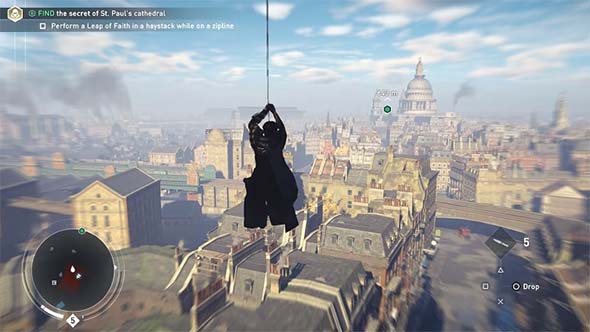
Many open world games have large, expansive maps that mostly feel empty and pointless,
as the player rushes through them simply to get to the next map marker or checklist item.
But now that I've established what I see as a problem, I want to focus on positive feedback. In this discussion, I'm going to look at a handful of games that should serve as inspirations for would-be open world developers. Ironically, some of these games aren't even open world games, but they still pose valuable lessons for how games that are open world could better use their game spaces. That isn't to say that the games discussed here are perfect. In fact, many of them have their own major flaws. But each of them has some element of design that utilizes the actual game map as a component of active play, rather than just a space in which game sequences exist. First, let's take a look at a game that was re-made recently, and use it as a "before and after" case study of map design... [More]
75d0658b-0278-43f3-a9e5-d3df3d01939d|4|4.3
Tags:open world, map, traversal, travel, cartography, geography, narrative, ludonarrative, ludonarrative dissonance, quest, vehicle, driving, racing, exploration, wasteland, survival, resources, Ubisoft, Bethesda, Resident Evil, Metal Gear Solid V: the Phantom Pain, Assassin's Creed, The Elder Scrolls, Skyrim, The Witcher 3, Grand Theft Auto, Grand Theft Auto V, Grand Theft Auto: San Andreas, Shadow of Mordor, Fallout, Fallout: New Vegas, Wasteland 2, Mad Max, Miasmata, Assassin's Creed IV: Black Flag, Burnout: Paradise, Shadow of the Colossus, Dark Souls
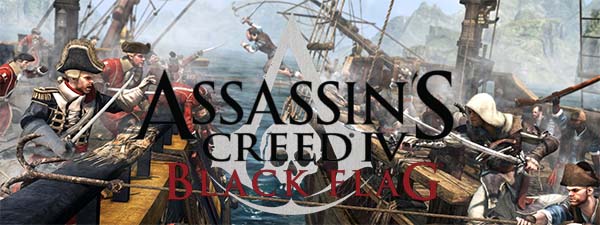
It occurs to me that there is a sad dearth of pirate and sailing games in the market. The original Sid Meier's Pirates! is almost 30 years old! And the PC remake was released all the way back in 2004. Other than that, the only pirate or sailing-themed video games that I'm aware of are mobile games.
We saw a proliferation of cowboy and western-themed games after Rockstar's Red Dead Redemption (which, in hindsight, probably isn't as good as I gave it credit for). Perhaps Assassin's Creed IV: Black Flag could trigger a similar renaissance for pirate video games. And if those games are as good as Black Flag (or better), then that would be a real treat!
Hrm, this mission seems familiar...
[LEFT] A plantation raid in Assassin's Creed III; [RIGHT] another plantation raid in Black Flag.
The first hour or two after Black Flag's introductory pirate ship battle is a bit dull because it's mostly just the same old stuff that you've played in Assassin's Creed III: exploring the little town and playing a few "go here, do this" missions with an assassination or two.
Being stuck on land is usually pretty dull. In fact, some missions even seem copy-pasted from previous games. When I got to the mission in which I had to raid a sugar plantation, I couldn't help but think "Hey, didn't I already do this in III?" The only notable difference was that that the plantation raid was wrapped in a segment in which I had to pursue the plantation-owner's ship from a trade island to his plantation island.
Over the course of the game, you'll frequently be forced to step back onto land for story missions. some of the environments are a bit original, since there's some trekking through jungles and along beaches and scaling cliffs to break up the monotony of the usual parkour that the series is known for. Most of these jungle paths are closed and linear, so you won't be exploring open jungle with a machete.
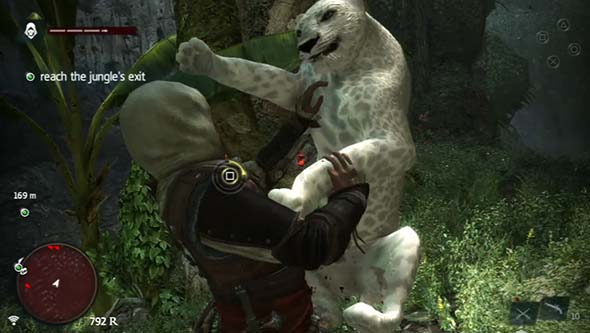
The jungle and beach settings provide some visual variety beyond the city parkour, but are functionally similar.
There aren't any dramatic new gameplay functionalities associated with the more rural and wild settings beyond the tree-hopping that was featured in Assassin's Creed III. So while these missions provide some visual variety, they don't add much to the actual gameplay. The biggest change is that it takes a lot of your freedom of movement away, since you have to follow more of the pre-designed trails through the levels, rather than having the freedom to create your own route.
...
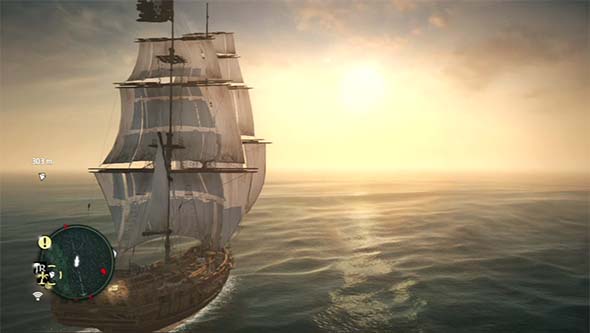
Black Flag sails triumphantly into the sunset as a stand-out game in an oversaturated franchise.
[More]
7e892d39-9984-470d-9a5a-364999153dc1|0|.0
Tags:Assassin's Creed, Assassin's Creed IV: Black Flag, Ubisoft, Caribbean, Cuba, Havana, assassin, parkour, pirates, swashbuckling, sailing, naval combat, privateer, history, historical fiction, Black Beard, Britain, Spain
|

| 12 | | | | | | | 60 | | 11 | | | | | | | 55 | | 10 | | | | | | | 50 | | 09 | | | | | | | 45 | | 08 | | | | | | | 40 | | 07 | | | | | | | 35 | | 06 | | | | | | | 30 | | 05 | | | | | | | 25 | | 04 | | | | | | | 20 | | 03 | | | | | | | 15 | | 02 | | | | | | | 10 | | 01 | | | | | | | 05 |
|